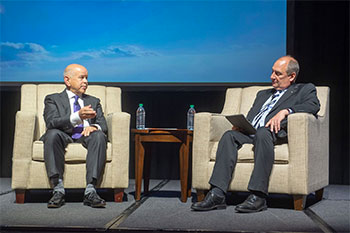Political Challenges of Aviation Written 28 June 2018
Panelists: Moderator David Hills, vice president of research and technology, Airbus; Michael Huerta, senior adviser, Macquarie Holdings
by Tom Risen, Aerospace America staff reporter (2017-2018)

Michael Huerta, a former FAA administrator, emphasized the need for data sharing, international collaboration and public education to achieve the aviation industry’s common goal of safety June 27 during his “Aviation Transformation — The Ultimate Team Sport” speech and on-stage discussion at the 2018 AVIATION Forum in Atlanta.
The way people fly is changing and will require the industry to ask tough questions on topics, including how to improve air traffic management, said Huerta, now a senior adviser at Macquarie Holdings financial services group. In addition to questions about how to improve safety, he said people in the industry also ask themselves “if something has worked fine the way it is, do I want to be the one to mess all that up?”
Electric vertical takeoff and landing vehicles that companies aim to offer for short flights from cities to suburbs raise questions about where to set safety standards for these new aircraft, he said, because “nobody is debating whether it is going to happen.”
“The age of the drone taxi is really just around the corner,” Huerta said.
Companies designing new types of aircraft in Silicon Valley and the established aviation community have to learn from each other so that improvements can be made without moving too fast.
“We have to be willing to throw out processes that have outlived their usefulness,” Huerta said, cautioning “maybe we don’t want to beta test around major airports because lives are on the line.”
Huerta nodded to efforts to research supersonic aircraft that create a quieter sonic boom but said the challenge of creating a regulatory path to allow commercial supersonic flights over land in the U.S. is mainly “a political problem, not a technical problem.”
After the discussion, Huerta said educating the public about new low-boom supersonic flight technology will be key because “the public has this very old notion of what supersonic means; that it is going to mean windows shaking and china breaking.”
Discussing the Brexit vote in the U.K. to separate from the European Union, Huerta said it will be “a big problem” for U.K. airlines to fly between London to New York, which is among the busiest flight paths in the world. Officials in the U.K. are negotiating to have an affiliate membership after March 2019 with European Aviation Safety Agency, which is recognized by the FAA, Huerta said, adding that would be “the ideal situation” to allow the U.K. aviation industry to continue to operate flights and sell aircraft parts in the U.S.
